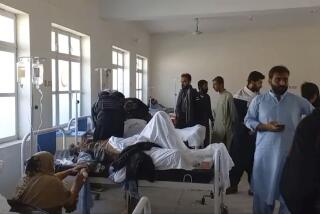British Case Renews Focus on Pakistan
- Share via
KARACHI, Pakistan — In the complex web of international terrorism, key strands cross frequently in Pakistan.
It was here that Rashid Rauf, said to be a major figure in the alleged plot to blow up as many as 10 airliners flying from Britain to the United States, was arrested. The government of President Pervez Musharraf is trumpeting the arrest as proof that it is keeping its commitment to fight Islamic militants.
Officials here say Rauf, a Briton who also holds Pakistani citizenship, disclosed details of the plot during questioning by Pakistani interrogators.
But that success also shows that Pakistan remains a crossroads of terrorism. In part, observers say, that’s because Musharraf, an army general who seized power in a 1999 coup, has allowed militants who are useful or have strong domestic political backing to remain free while others are arrested or killed.
By turning a blind eye to some extremists’ activities, Musharraf is said to have left ample sources of inspiration and training for supporters of a global jihad, of which Osama bin Laden’s Al Qaeda terrorist network is the best known.
“Many Pakistani jihadi groups have started serving as intermediaries and facilitators for potential recruits to new ‘baby Al Qaedas,’ ” said Husain Haqqani, who has written a book on the long relationship between Pakistan’s military and extremist groups.
“Pakistan remains the center of ideological extremism and the home of a growing Muslim culture of grievance and anger against Western domination,” said Haqqani, who is now director of Boston University’s Center for International Relations.
A week after Al Qaeda’s Sept. 11 attacks, Defense Secretary Donald H. Rumsfeld said the best way to rid the world of terrorists was “to drain the swamp they live in.”
Musharraf pledged his support for the effort, promised to help get rid of the Taliban regime in neighboring Afghanistan and said he would make his country an example of Islamic moderation rather than a base for militancy.
To many, including the majority of Pakistanis who oppose Muslim radicals, it sounded good: Musharraf seemed determined to clean up the messy legacy of governments that had supported militant groups to maintain power.
Musharraf’s government says Pakistani security forces have arrested more than 700 suspected members of Al Qaeda since 2001. They include such major figures as Khalid Shaikh Mohammed, the alleged mastermind of the Sept. 11 attacks. The Pakistani military also has suffered heavy casualties in attempts to clear Al Qaeda and allied militants from the largely autonomous tribal areas of North and South Waziristan, feeding opposition from the religious and political right.
But as with many of Musharraf’s commitments in the U.S.-declared war on terrorism, his actions haven’t been nearly as strong as his words.
He is under pressure from members of Pakistan’s security establishment to maintain support for some militants. Several powerful militant groups, including the now outlawed Jaish-e-Muhammad, have been fostered by the Pakistani military’s Inter-Services Intelligence directorate to fight an insurgency in the Indian-controlled portion of Jammu and Kashmir.
Military hard-liners see India’s refusal to compromise in the 59-year conflict over Kashmir, as well as New Delhi’s growing influence in Afghanistan, as proof that cooperation in anti-terrorism efforts has failed to protect Pakistan’s strategic interests.
Pakistan also accuses India and Afghanistan of supporting rebels in Baluchistan province, where a growing insurgency threatens crucial natural gas supplies.
Musharraf faced intense pressure to act after the July 2005 London transit attacks. Three of the four suicide bombers were Britons of Pakistani origin. Two had visited Pakistan before the attacks, which killed 52 people, and one had attended a radical madrasa, or religious school.
The government quickly announced that it would expel all 1,400 foreign students studying in Pakistani madrasas.
A few were deported. But the Muttahida Majlis-e-Amal, an Islamic bloc that forms the main opposition in Pakistan’s parliament and controls the governments of two provinces on the Afghan border, led the fight against the expulsions and forced Musharraf to back down.
Under a compromise, foreign students have been allowed to continue their studies but are supposed to get permission from their home countries. There were an estimated 1,100 foreign students in madrasas when the compromise was reached and the government says 40% of them have left the country.
Madrasa administrators have assured authorities they will arrange the required permission for their students. But in a country where corruption in government is rife, Musharraf’s softer approach leaves the door open to foreign extremists who want to contact militant groups through the schools.
At the same time, the government has done little to stop militant groups from operating in longtime strongholds.
Several people arrested in connection with the alleged airliner plot were picked up in the town of Bahawalpur, long a center of Islamic militancy in Punjab state, where several leading radical groups are headquartered.
They are concentrated in towns in impoverished central and southern Punjab, strongholds of Deobandis, followers of a Sunni Muslim revivalist sect that emerged in the 19th century as a movement against British rule in the Indian subcontinent.
Books and magazines preaching hatred against the West and Shiite Muslims are sold in abundance in most bookstores in towns such as Bahawalpur, Muridke and Jhang, security sources in Islamabad acknowledged. They spoke on condition of anonymity because they are not authorized to speak to the media. Musharraf’s government has banned hate literature but has done nothing to crack down on the publications, they say.
Bahawalpur, a farming and textiles center near the Indian border, is the base for Jaish-e-Muhammad, an outlawed group that India’s intelligence service says is still operating underground, despite a long history of cooperation with Al Qaeda. Members of the group have been linked to attempts to assassinate Musharraf, yet its leader, cleric Maulana Masood Azhar, has never been charged with a crime. Pakistani authorities say they cannot find him.
Ahmad Omar Saeed Sheikh, the Briton of Pakistani descent convicted in the slaying of Wall Street Journal reporter Daniel Pearl, is an Azhar disciple. Pearl visited Bahawalpur while investigating links among Pakistani militant groups before he was kidnapped and killed in 2002.
Sheikh was sentenced to death but is appealing.
Another prominent militant, Hafiz Mohammed Saeed, has continued to preach holy war against the West since Musharraf banned his group, Lashkar-e-Taiba. It simply reemerged as Jamaat ud-Dawa, and operates legally. Its headquarters is in Muridke in Punjab state.
As Britain moved against suspects in the alleged airliner bomb plot, Pakistan’s government put Saeed under house arrest Thursday for one month but made no explicit link to the British investigation.
Pakistani intelligence sources said Rauf and a second unidentified British national arrested here had both met Saeed, who was scheduled to address a rally Monday marking Pakistan’s Independence Day.
Indian authorities believe Saeed or his supporters are behind bombings in New Delhi last October that killed more than 50 people on a bus and in markets crowded with people shopping for Diwali, an important holiday for Hindus.
India also says Saeed’s group had a hand in last month’s serial blasts that killed as many as 200 people on trains in Mumbai, formerly known as Bombay. On Friday, the U.S. Embassy in New Delhi warned Americans of a threat by “foreign terrorists,” possibly including Al Qaeda, to launch attacks as India prepares to celebrate its Independence Day on Tuesday.
Although Musharraf insists he is steadfast against terrorism, critics such as Haqqani say the his mistakes created many of his current problems.
“Musharraf has done little to change the overall environment of hatred toward Jews, Christians and Hindus and the view that Muslims are victims of a global conspiracy, which can best be fought with unconventional war and terrorism,” Haqqani said.
Times staff writer Watson reported from Karachi and special correspondent Zaidi from Islamabad. Special correspondent Shamim ur-Rahman in Karachi contributed to this report.
More to Read
Sign up for Essential California
The most important California stories and recommendations in your inbox every morning.
You may occasionally receive promotional content from the Los Angeles Times.













